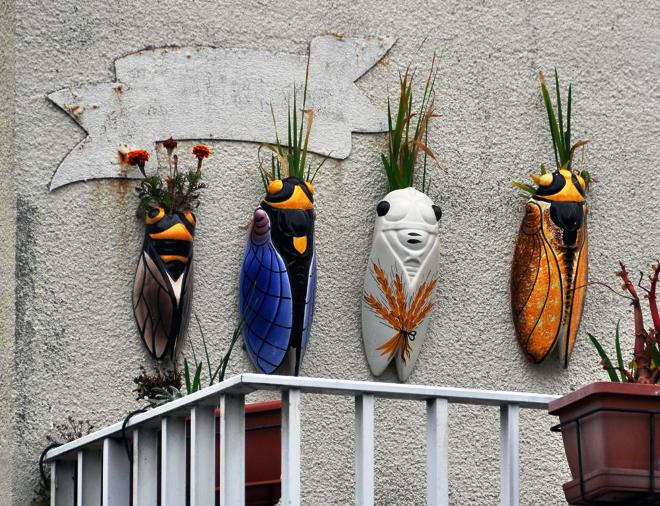You Say Cigales, We Say Cicadas

If you’ve been to Provence, you’ll recall colorful ceramic winged creatures, in all sizes, in every market. Part of the region's folklore, those charming cigales are CICADAS! How creepy can they be if the French decorate their walls and sofas with them?
Time for a bit of rebranding for our bug de summer, n'est-ce pas?
So here are 15 things you didn't know about cicadas from Marseille-Provence:
1) The cicada became the noisy spokesinsect of provençal culture thanks to the poet Frédéric Mistral, who in 1854 created the Félibrige, an association to promote the provençal language and traditions.
 He illustrated his bookplates with a cicada and the legend, "Lou souleu mi fa canta," provençal for "The sun makes me sing".2) Louis Sicard, a ceramicist based in Aubagne, was asked in 1895 by a wealthy tile manufacturer to make a typical provençal artefact as a gift for its business clients. He created a paperweight, a cicada sitting on an olive branch bearing Mistral's epigram. It was a huge hit and Sicard adapted it for brooches, vases and cups.3) Today cicadas feature prominently on provencal fabrics-les indiennes, and jumbo pottery versions hang on the façades of houses to which they allegedly attract luck and happiness.
He illustrated his bookplates with a cicada and the legend, "Lou souleu mi fa canta," provençal for "The sun makes me sing".2) Louis Sicard, a ceramicist based in Aubagne, was asked in 1895 by a wealthy tile manufacturer to make a typical provençal artefact as a gift for its business clients. He created a paperweight, a cicada sitting on an olive branch bearing Mistral's epigram. It was a huge hit and Sicard adapted it for brooches, vases and cups.3) Today cicadas feature prominently on provencal fabrics-les indiennes, and jumbo pottery versions hang on the façades of houses to which they allegedly attract luck and happiness.
4) There are about 2,500 species of cicada around the world and 15 or 16 in Provence. Some species can live for up to 17 years; provençal cicadas live for four years, all but a few weeks of which are spent underground in the form of grubs.5) It's the males who make the noise to attract females to the tree where they are sitting (they are remarkably adept at camouflague). They produce the sound by contracting and relaxing tymbals, ribbed membranes inside their stomachs. The Ancient Greek poet Xenophon praised this quality: "Blessed are the cicadas, for they have voiceless wives".6) The chirping is done by large numbers of individuals in concert, in order to confuse predators and each species produces a slightly different sound in order to ensure the female of the correct species is attracted.
7) The cicada is the one of the world's loudest insects, recording sounds of up to 120 decibels. The males have to "switch off" their hearing organs while they sing, in order to avoid going deaf. Below 22 degrees Centigrade, the resounding sections of the diaphragm lose their elasticity. For this reason the cicada shuts up during rain or after sunset.
8) According to provençal myth, the cicada was sent by God to disrupt the peasants' endless siestas and stop them from growing too lazy.9) Once hatched, cicadas live from sucking tree sap. Sometimes they mistake a person's arm or leg for a branch and try to feed by sticking a sharp proboscis into it.
10) Cicadas can emit a jet of urine when disturbed or threatened and in the past provençal people believed they had diuretic properties.
Every summer, peasants would thread their bodies on to a string, hang them up to dry, then boil up them to make an infusion or tisane as a remedy for urinary tract related ailments.
11) The Imperial Chinese were fascinated with cicadas. They used them as a decoration on furniture and clothes, and created the high-ranking post of "Grand Cicadist", whose job was to make sure the emperor had a regular supply to regale him with their songs.
12) The Ancient Greeks were equally keen on the cicada, which they regarded as a symbol of Apollo, the god of music and of the sun.
 People wore gold cicadas as ornaments in their hair and Athens featured them on some of its coins (example pictured).
People wore gold cicadas as ornaments in their hair and Athens featured them on some of its coins (example pictured).
13) Apart from Xenophon, writers who celebrated the cicada include Homer, in the Illiad and Plato, in Phaedrus, which relates that cicadas were once men who became so enthralled with music that they forgot to eat and drink and their bodies wasted away.
The slave and storyteller Aesop created one of the best-known fables of all, The Cicada and the Ant, later reinterpreted by the 17th century French writer Jean de la Fontaine. The Roman poet Virgil was less enamoured. In both the Georgics and the Bucolics, he railed against the "rowdy" cicada.14) A ballet has been written about the cicada: La Cigale by the French composer Jules Massenet. It is rarely, if ever, revived and is not part of the standard ballet repertory.15) You'll see plenty of restaurants called La Cigale in Provence. But - though they are a delicacy in North American and Asia - you won't see cicadas on the menus. Do not confuse with cigales de mer, which are like very small lobsters. Though hard to come by these days, they're a sought-after ingredient of bouillabaisse.
